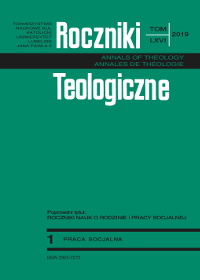Poczucie samotności a preferencje wartości osób bezrobotnych z różnym poziomem samooceny
Sense of Loneliness and Preference for Values of the Unemployed People Identified with Various Levels of Self-Esteem
Author(s): Janusz KirenkoSubject(s): Social Sciences, Sociology, Family and social welfare
Published by: Towarzystwo Naukowe KUL & Katolicki Uniwersytet Lubelski Jana Pawła II
Keywords: unemployment; loneliness; values; self-esteem
Summary/Abstract: A sample of 339 unemployed subjects, including 236 women (69,62%) and 113 men (33,33%) was examined. The vast majority of the participants, namely 283 (83,48%), were not entitled to unemployment benefit, the remaining 56 persons (16,52%) had the right to be supported in diverse ways. The age of the subjects ranged between 19 and 60, but the mean age was 33,67. Most participants of the study used to live in rural settings and their education levels were either high or quite low (sometimes they just graduated from secondary, vocational school). The data were collected by means of a diagnostic survey/method that comprised a set of the following research tools: Social and Emotional Loneliness Scale for Adults (SELSA) by E. DiTommaso, B. Spinner; Portrait Values Questionnaire (PVQ-R2) by S. Schwartz; Self-Esteem Scale (SES) by M. Rosenberg; an additional questionnaire constructed by the author. A specific structure of the associations between certain selected variables encompassing: sense of loneliness (dependent variable), preference for values (independent variable), self-esteem (moderator variable) was unveiled. An emphasis was laid on those variables that may have been influential in the empirical realm. A stepwise multiple regression analysis allowed to find out about fairly precise features of the disclosed relationships that seemed to aspire to the autonomous conclusion.
Journal: Roczniki Teologiczne
- Issue Year: 66/2019
- Issue No: 1
- Page Range: 139-157
- Page Count: 19
- Language: Polish

